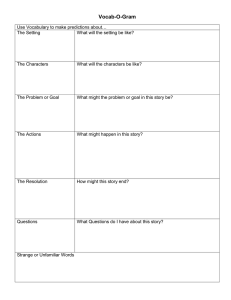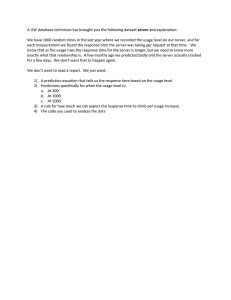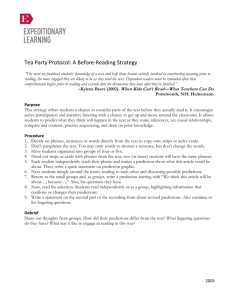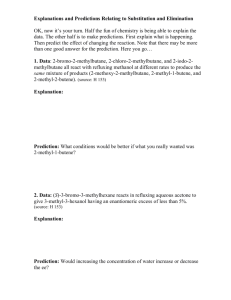Date: Wed, 12 Sep 2007
advertisement
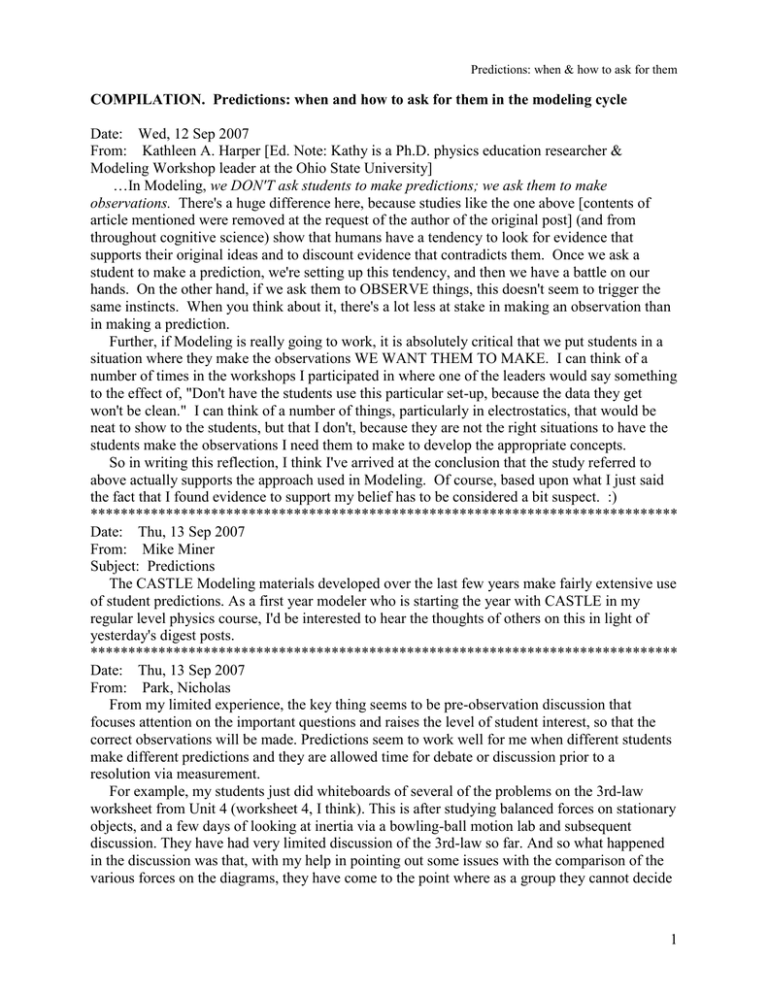
Predictions: when & how to ask for them COMPILATION. Predictions: when and how to ask for them in the modeling cycle Date: Wed, 12 Sep 2007 From: Kathleen A. Harper [Ed. Note: Kathy is a Ph.D. physics education researcher & Modeling Workshop leader at the Ohio State University] …In Modeling, we DON'T ask students to make predictions; we ask them to make observations. There's a huge difference here, because studies like the one above [contents of article mentioned were removed at the request of the author of the original post] (and from throughout cognitive science) show that humans have a tendency to look for evidence that supports their original ideas and to discount evidence that contradicts them. Once we ask a student to make a prediction, we're setting up this tendency, and then we have a battle on our hands. On the other hand, if we ask them to OBSERVE things, this doesn't seem to trigger the same instincts. When you think about it, there's a lot less at stake in making an observation than in making a prediction. Further, if Modeling is really going to work, it is absolutely critical that we put students in a situation where they make the observations WE WANT THEM TO MAKE. I can think of a number of times in the workshops I participated in where one of the leaders would say something to the effect of, "Don't have the students use this particular set-up, because the data they get won't be clean." I can think of a number of things, particularly in electrostatics, that would be neat to show to the students, but that I don't, because they are not the right situations to have the students make the observations I need them to make to develop the appropriate concepts. So in writing this reflection, I think I've arrived at the conclusion that the study referred to above actually supports the approach used in Modeling. Of course, based upon what I just said the fact that I found evidence to support my belief has to be considered a bit suspect. :) ****************************************************************************** Date: Thu, 13 Sep 2007 From: Mike Miner Subject: Predictions The CASTLE Modeling materials developed over the last few years make fairly extensive use of student predictions. As a first year modeler who is starting the year with CASTLE in my regular level physics course, I'd be interested to hear the thoughts of others on this in light of yesterday's digest posts. ****************************************************************************** Date: Thu, 13 Sep 2007 From: Park, Nicholas From my limited experience, the key thing seems to be pre-observation discussion that focuses attention on the important questions and raises the level of student interest, so that the correct observations will be made. Predictions seem to work well for me when different students make different predictions and they are allowed time for debate or discussion prior to a resolution via measurement. For example, my students just did whiteboards of several of the problems on the 3rd-law worksheet from Unit 4 (worksheet 4, I think). This is after studying balanced forces on stationary objects, and a few days of looking at inertia via a bowling-ball motion lab and subsequent discussion. They have had very limited discussion of the 3rd-law so far. And so what happened in the discussion was that, with my help in pointing out some issues with the comparison of the various forces on the diagrams, they have come to the point where as a group they cannot decide 1 Predictions: when & how to ask for them how the forces of the two blocks on each other compare - they have convinced each other that there is a good question here. And so tomorrow we will do a lab using two Vernier force plates to answer the question and establish the 3rd law. Of course, this is conclusion based on a small sample-size, limited to my own observations. ****************************************************************************** Date: Thu, 13 Sep 2007 From: Rob Spencer I have found that asking the class for a general prediction of the relationship between the two variables about to be studied goes a long way in giving them some initial confidence before their experiment. After showing the physical situation and having them decide on the two variables in the experiment, I ask them what will happen to variable B when variable A is increased. I will give them the choices of: 1) variable B will increase 2) variable B will decrease 3) variable B will not react (no relationship) Inevitably, most of the class gets the initial prediction correct. For instance, in unit 2/3: As the clock readings increase, what happens to the position of the buggy/car? Unit 5: As the mass is increased (for a constant force), what happens to the acceleration? , As the force is increased (for a constant mass), what happens to the acceleration? , As the normal force in increased, what happens to the friction? Unit 7 (my central force unit): As the speed of the object being whirled in the circular path increases, what happens to the tension in the string? As the mass of the object being whirled in the circular path increases, what happens to the tension in the string? (and not so intuitive), as the radius of the circular path decreases, what happens to the tension in the string? Unit 8 (my energy unit): As the force stretching the spring increases, what happens to the stretch? As the spring's compression increases, what happens to the height of the low-friction car moving up the ramp? As the spring's compression increases, what happens to the speed of the low-friction car on the level track? By the end of mechanics, the students know that if an increase in A causes an increase in B, they should look for linear, top opening, or side opening relationships...if an increase in A causes a decrease in B, they should look for an inverse relationship...if an increase in A doesn't affect B (amplitude and period of pendulum for instance), then there is no relationship. As they gain experience, they are not taken aback by more complicated relationships likeinverse-square, etc. I think it is a good thing for the students to have a sense of the relationship and then do the experiment in order to determine the details ****************************************************************************** Date: Mon, 17 Sep 2007 From: P. Gregg Swackhamer I have always wondered what we are doing in certain cases when we ask students to make predictions prior to their having access to desired models or even to more primitive concepts. I am not talking about every instance in which one would ask students to predict; I'm sure there are very productive times for students to predict things. But what do we expect students to do when we ask them about things for which they have to invent some model on the spot, such as might occur when one asks What will happen to all the other bulbs in this circuit when I take this 2 Predictions: when & how to ask for them one bulb out of the circuit? It interests me, because eliciting ideas too early could conceivably be counterproductive. Sometimes I wonder if we ask students to think in ways that interfere with their progress. Perhaps, when they are asked about something prematurely, students marshall support for their prediction that results in and strengthens a counterproductive model that wouldn't be there if we would only wait a bit. I suppose it amounts to asking questions too early. I haven't followed the research. However, this asking too early is something I wonder about mostly when I see the 'elicit, confront, resolve' mode of instruction. I haven't followed the research along that line...I wonder if there is some research about WHEN we should ASK questions and WHEN we should WAIT for cognitive infrastructure to be in place to provide richer meaning to observations and interpretations. Anyone know anything about this sort of thing? ****************************************************************************** Date: Mon, 17 Sep 2007 From: Rob Spencer My physics 1 regular students tend to be scared of the science process and I think that I have begun this prediction prior to experimentation to show them that they DO have intuition about the way the world works that is correct. I was always sort of put off in my physics upbringing when I would be asked to predict something in a demo that seemed obvious to us students and then the teacher would show our prediction to be wrong. I then started predicting the opposite of what my intuition told me to predict just because I knew the physics teacher was trying to trick me and my classmates. In developing Newton's 3rd law, I suppose many use the approach of asking students to commit to a prediction about an interaction. Then we confront them with proof of the opposite and they then discard the old model (hopefully) for the new model. The modeling CASTLE curriculum sort of hangs its hat on the VLab approach in which students make predictions about a situation prior to testing. I find that my students are much more successful in their mechanics general predictions (minus of course N3) than they are with electric circuits. So maybe the more abstract a concept/model is, the more dangerous it is to ask for student predictions. As you can see, I am trying to associate a relationship between the relative abstraction of concepts and the utility of asking for predictions in advance. ****************************************************************************** Date: Tue, 18 Sep 2007 From: Paul Wendel Once at a workshop Alan van Heuvelen described an informal experiment: He had two sections of introductory physics that quarter, so he tried to teach them with only this difference: One class was asked to predict before every demo and the other was not. The results were telling: First, neither group performed better on any of his assessment instruments. (I don't remember whether he used the FCI, FMCE, etc., but I'm sure that Alan measures conceptual understanding.) Second, the students in the "prediction" class rated him much lower on the Student Evaluation of Instruction. It appears to me that in this case, predicting produced no educational benefit but a large affective penalty. ****************************************************************************** 3 Predictions: when & how to ask for them Date: Tue, 18 Sep 2007 From: Brant Hinrichs I have NOT seen anything saying WHEN we should ASK and WHEN we should WAIT. If anyone has, I’d also love to see them. But, I know Eugenia Etkina [ed. Note: a physics education researcher at Rutgers University] has gone away from the elicit / confront / resolve model so prevalent in physics education research-based curriculum. My understanding is that she has gone away from it precisely because of the comments from her students like Rob wrote about always being wrong in their predictions, so learning to always predict opposite of what they really think (i.e. very bad epistemology). She has also gone to a model of science learning that she thinks (and I agree to a strong degree) is more like what scientists actually do. She says scientists don't just blindly predict in a new situation. They make lots of observations first to see if they can find patterns in a particular type of system. Then in new situations they use the patterns built from prior patterns to predict what they think they'll see in this new situation, which they think is sufficiently similar to the prior systems.(i.e. does the old model work in this new situation? If yes, great; if not, can the old model be modified? If yes, great, if not, then what new model must be created?). She is developing a very interesting paradigm. I recommend her workshops at AAPT national meetings. And checking out her ISLE site: http://www.islephysics.net ****************************************************************************** Date: Wed, 19 Sep 2007 From: Tim Burgess I am not surprised at the results. "Prediction" requires that students use models they already have, to explain and predict events. When you ask students to relate predictions and explanations they become very very vulnerable and it can be uncomfortable. Large group verbal predictions will, in most environments, be a disaster (unless you have a student with such an extreme self image that they enjoy being vulnerable). Yet when we watch the "Private Universe" film series we see the effects of "direct instruction". The instruction is very efficient and students learn to parrot the correct answers and pass tests. One of the messages of this film series is that students are not blank slates and we need to listen to them. Yet this study says just the opposite. So we have a contradiction: Students are uncomfortable predicting & genuine learning requires prediction. To overcome this apparent dichotomy, a teacher must create an environment that is safe and where failure is acceptable because it helps your grade (in my class just a little). Many students prefer privately related predictions (I have found this) so while there is large group opportunity I also make sure there is small group discussion and written prose. To elicit a comfort level in your students required for them to reveal their personal models (and make predictions) requires that I know their first name and be able to have a personal conversation. I am all ears and want to know what they think. I even dedicate time (wait time) and patience to the process. Then we use their model to predict. We find out together (it does take some acting). The whole process of eliciting student predictions, expectations & genuine questioning requires an immense amount of savvy and experience in interactive engagement. The modeling workshops provide practice for this (the only way to do it). I doubt that requiring a prediction before a large scale presentation comes anywhere near what is required for a classroom 4 Predictions: when & how to ask for them environment that encourages discourse. The experiment, as tersely described, appears to think instruction is method with appropriate timings and I THINK IT IS but it is ALSO an art that requires interpersonal skills, relationships and experience. There are a number of variables I wonder about including: Comfort? Relationships? Wait time? Patience? Encouragement? Credit? Prediction requires risk, discomfort and thought. It is no wonder that it is not a popular experience in most situations. Working hard for grades makes sense to most. Working hard at thinking is a no-gainer (in fact the more thinking the more "mistakes") ****************************************************************************** Date: Wed, 19 Sep 2007 From: Tim Erickson First, let me second the notion that Alan van Heuvelen and Eugenia Etkina are always worth listening to. I have taken Eugenia to be my prediction guru. But let me add that prediction comes at several levels. I think really informal prediction can be helpful in orienting students to what is going on, get them to observe more closely. One way is to let students see or feel a phenomenon briefly, so they have some small experience with it WITHOUT measuring, and then ask them to predict what the resulting graph will look like when they do measure. The point in this case is to give them a sense in advance of the overall shape of the graph, as in, the more the ramp is tilted, the LESS time the cart will spend in the photogate. So this can be grossly qualitative, and more about connecting common sense with the variables and with the resulting graph. My purpose in this case is 1) give them a positive (NOT dissonant) experience 2) give them a chance to pick up on really bad data when they actually do the hands-on measurements. We could then point out, looking at the gross qualitative prediction, that we can't tell from our reasoning whether the graph is straight or curved, and if so, in what direction. This gives us something to wonder about. But you can then think about extreme cases and get some idea: in the case of the cart and photogate, students can reason that the time in the gate will never go to zero, so although the slope has got to be negative, the graph had better not hit the axis. This kind of thinking is good practice of course. I claim (without having done the PER experiment) that we can do all this without getting the bad effects of uninformed prediction. Prediction is vital, however, in what Etkina and the ISLE folks call a testing experiment, where we have developed a quantitative model and now want to take measurements to test it, so that we say, "IF my idea is correct AND I set up the equipment this way, and do this, THEN I will get the following result..." ****************************************************************************** Date: Wed, 19 Sep 2007 From: Bob Bogenrief I react to the post that suggests that students would be blindly predicting. We have always heard that prediction, or hypothesis, is based on an "educated guess." In the CASTLE curriculum not only are students asked to make predictions; they are also asked, at least, on occasion, to explain the reason for their expectation. This request pushes them to articulate their current model of circuits. The intent is that an incorrect prediction will provide an impetus for reexamining the model in the light of new evidence. ****************************************************************************** 5 Predictions: when & how to ask for them Date: Thu, 20 Sep 2007 From: Tim Burgess I totally agree. Where students have not formally generated a model then "expectation" and "how come the expectations" are nice ways to transmit a way of thinking on this type of prediction. Sitting down and expecting exact results for a formally developed model is typical of professional research and I like that too. Date: Sat, 17 May 2008 From: Jane Jackson <jane.jackson@ASU.EDU> Subject: Predictions in ISLE learning system of E.Etkina & Alan Van Heuvelen The ISLE learning system of Eugenia Etkina and Alan Van Heuvelen is similar to Modeling Instruction. The ISLE cycle is described at http://paer.rutgers.edu/pt3 or http://www-rci.rutgers.edu/~etkina/, click on "real time videos". Below is an excerpt from the "Introduction: Motivation" section, that shows the role and place of predictions in ISLE. Just like Modeling Instruction, students DO NOT make predictions at the beginning of the ISLE cycle. Rather, they observe, and then model. I quote: ---------------------------------In the spirit of a "cognitive apprenticeship" students learn the processes of science rather than the results. And the processes are learned by participation in them, i.e., by observing and modelling the thought processes of an expert physicist, and by doing. Areas of physics are divided up into conceptual modules. Each module begins with one or more observation experiments. Little explanation is given, but scaffolding is provided to guide students through the technical details of making useful observations. Students examine the data, looking for patterns and relations between the physical quantities. They then construct a rule which models these patterns. The observations and modelling will be followed by one or more testing/application experiments. Students either use their model to make a prediction and then devise an experiment to test the prediction, or they are given a challenge which requires them to use their model to achieve a desired objective. If things do not work out as planned, students have to go back and revise their model, the assumptions made, the accuracy of any calculations and so on. In the testing/application stage, the following reasoning scheme can be observed and practiced so that students acquire the skills of what is called "hypothetico-deductive reasoning". In following this process through, students are engaging in a process of mental modelling, constructing their own knowledge of physics in the same way as physicists do it. Not only do they understand the physics they are doing, but they are equipped with learning skills useful in any branch of science. 6
